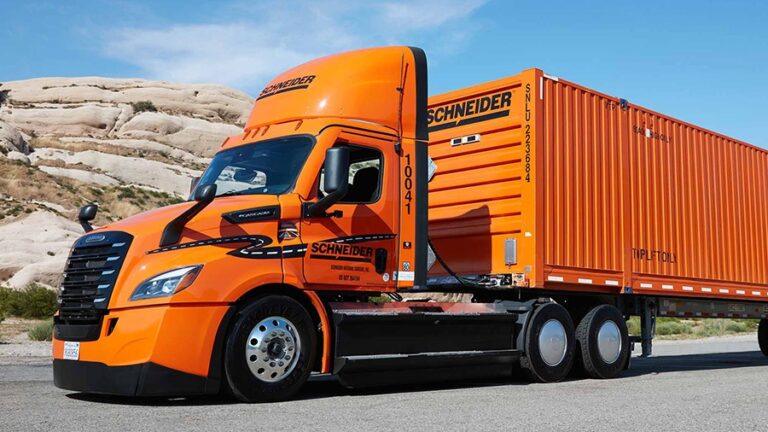GREEN BAY, Wis. — Schneider National Inc. is marking another significant milestone as its battery electric vehicle (BEV) fleet has surpassed six million zero emission miles, highlighting its commitment to reducing carbon emissions and advancing cleaner transportation.
“Reaching six million zero emission miles is a testament to our steadfast dedication to sustainability and innovation,” said Mark Rourke, Schneider president and CEO. “Leading the way in adopting electric vehicle technology not only benefits the environment but also serves as an example of the broad service capabilities and flexibility we can offer to customers.”
According to a company press release, this latest achievement means Schneider has had an impressive reduction of 20 million pounds of carbon dioxide (CO2) emissions since the company started using BEVs — equivalent to removing over 2,100 gas-powered passenger vehicles from the road for one year.
Schneider operates one of the largest BEV fleets in North America, which includes nearly 100 Freightliner eCascadias from manufacturer Daimler Truck North America LLC (DTNA). To power its electric fleet, the company operates a large charging depot at its Southern California Operations Center in South El Monte. The depot features 16 350 kW dual-corded dispensers, allowing the company to charge 32 trucks simultaneously.
“Schneider is a great example of the kind of forward-thinking entrepreneurship our industry needs,” said David Carson, senior vice president, sales and marketing at DTNA. “They’ve achieved over 6 million zero emission miles, which is a reminder for us all to keep working on overcoming challenges together on the path to zero emissions. At DTNA, we’re committed to the shift to zero emissions, alongside pioneers like Schneider, who are showing us what’s possible.”
Schneider’s BEV leadership benefits customers
As a responsible company, Schneider has established aggressive sustainability goals and invests in energy-efficient equipment. These efforts also support customers in meeting their own sustainability ambitions, and the BEV fleet has been a key differentiator for customers looking for more efficient transportation solutions. In 2023, Schneider was the first third-party carrier to haul zero emission shipments for PepsiCo globally, traveling more than 31,000 zero emission miles in a few short months, according to the release.
“PepsiCo is proud to celebrate this milestone driven by Schneider in California,” said David Allen, vice president and chief sustainability officer, PepsiCo Foods North America. As the first partner using their electric fleet, we’ve demonstrated the power of cross-industry collaboration in reducing emissions. Together, we are working towards a cleaner, healthier environment.”
Drivers also feel the benefits of the BEV fleet
In addition to customers, Schneider drivers have also embraced the electric trucks because of the excellent on-road experience they create. The feedback has been overwhelmingly positive, with drivers appreciating the smooth ride, reduced engine noise and ease of steering, according to the release.
“Once you drive an electric truck, you won’t want to go back to a diesel truck,” Marty Boots, a longtime Schneider driver. “The ride quality and the quietness make a huge difference in our daily operations.”
Contributing to our communities
The eCascadias primarily operate in Southern California, where they have significantly reduced emissions and contributed to cleaner air quality while transporting freight. Improving air quality in the Southern California community is important to mitigate the effects of smog and improve public health, according to the release. Aligned with the goal of improving air quality, Schneider’s fleet was made possible through a number of grants from organizations such as California Air Resources Board and the California Energy Commission’s Joint Electric Truck Scaling Initiative (JETSI), with additional support from the South Coast Air Quality Management District (AQMD).
Fifty of Schneider’s 92 eCascadias were made possible by the JETSI — a California-wide initiative working to reduce greenhouse gas emissions, strengthen the economy, and improve public health and the environment, particularly in disadvantaged communities.
Of the additional 42 trucks, five are jointly funded by the U.S. EPA FY18 Targeted Airshed Grant and Hybrid and Zero-Emission Truck and Bus Voucher Incentive Program (HVIP), seven are funded by the Volkswagen Environmental Mitigation Trust and 30 trucks are funded by HVIP.
“Achieving six million zero emission miles is more than a milestone — it’s a clear demonstration of how innovation in transportation can lead to cleaner, healthier air for our communities,” said Wayne Nastri, South Coast AQMD’s executive officer. “By embracing battery electric vehicles, Schneider is setting a great example for the industry while directly contributing to improved air quality and public health in regions like Southern California.”
Commitments beyond BEVs
According to the release, with a goal to reduce CO2 emissions by 7.5% per mile by 2025 and achieve a 60% reduction in CO2 emissions per mile by 2035, Schneider is paving the way for a more sustainable future in transportation by extending efforts beyond its electric fleet with a broader commitment throughout the industry.
As a responsible carrier, Schneider is exploring a variety of solutions to reduce carbon emissions in addition to the BEVs such as renewable natural gas and hydrogen internal combustion engines. Additionally, all of Schneider’s non-BEV tractors currently use a mixture of biodiesel — a renewable alternative derived from organic waste such as vegetable oil and animal fats — and conventional diesel, thereby reducing traditional diesel consumption.
For more information about Schneider’s sustainability initiatives, please visit: https://schneider.com/company/corporate-responsibility/sustainability.







